 | Forum
Thread | Ten Stand-out Moments in Ipswich History
at 13:25 11 May 2024
Thanks for the interesting comments on the Charlie Woods thread recently.
I didn't mention it at the time as I didn't want the thread to get sidetracked, but now we're both safely promoted, I can say that I usually write historical pieces about Leicester City. It was while interviewing ex-Filbert Street boss Gordon Milne last year that he put me in touch with his old friend Charlie.
The time I spent talking to him deepened my interest in his old club, and here I'd like to present an outsider's view of the stand-out moments in Ipswich Town history. You might find the choices a little biased towards the dim and distant past, but please comment and tell me what you think. I'll present it as a Top Ten:
10) September 4th 1956
It was all going wrong for Alf Ramsey. In his first season as Ipswich boss the club had narrowly missed out on promotion from Division Three South. Then at the start of the following season they lost five of the first six games. Only Plymouth Argyle were below them in the table, and if it carried on like this they wouldn't be celebrating promotion - they'd be seeking re-election.
What made it worse was that sitting proudly at the top of the division were Norwich City.
Alf didn't panic. He had faith in his players, and things gradually turned around - at both ends of the table.
Actually, for Norwich, it all turned sour pretty rapidly. After that fine start, they went an incredible 26 games without a win. By the time that sequence finally ended in early March, Ipswich were third in the table and Alf had Division Two in is sights. Now it was Norwich who were facing re-election.
Over Easter three victories, including a double over the Canaries, took Ipswich top with two to play.
That's where they ended up, and part one of Alf's miracle had been completed.
9) November 4th 1973
Miracle title-wins are something Ramsey and Ranieri have in common. 51 years ago, just as Claudio's story was beginning, Alf's was coming to an end.
Ranieri made his debut as a professional on November 4th 1973, playing for Roma against Genoa in Serie A. That was a very interesting day in the Italian capital. Arriving on a plane from England were the Ipswich Town squad, there for the second leg of a UEFA Cup tie against Lazio.
On that first day in the Eternal City, Ipswich got themselves into a bit of trouble. Trevor Whymark innocently posed for a photo with a group of Roma fans, who presented him with a plaque for scoring four against their bitter rivals in the first leg two weeks earlier.
Whoops. That picture was in the paper the next day, and fanned the Lazio flames.
The game at the Olympic Stadium has gone down in history. Ipswich lost 4-2, but went through on aggregate, while the behaviour of Lazio players, staff and supporters led to the club being banned from Europe.
Claudio Ranieri's career was just beginning, but Alf Ramsey's was drawing to a close. A week later, the Italian national side came to England and won 1-0. Nobody knew it then but that was the last time he would lead the side out at Wembley.
8) There are more than a few Manchester United fans casting envious glances towards Portman Road at the moment, thinking that Kieran McKenna would be the ideal choice to fill the forthcoming vacancy at Old Trafford.
If McKenna did move on, to United or any other club, many would give a resigned shrug and say 'He's an ambitious guy. You can't blame him for taking one of the top jobs'.
But there was a time long ago when the roles were reversed.
In October 1937, Scott Duncan had been Manchester United manager for five years when he was poached by a Southern League club who had only recently turned professional. Ipswich Town offered him a salary that United just couldn't match, and he moved south:
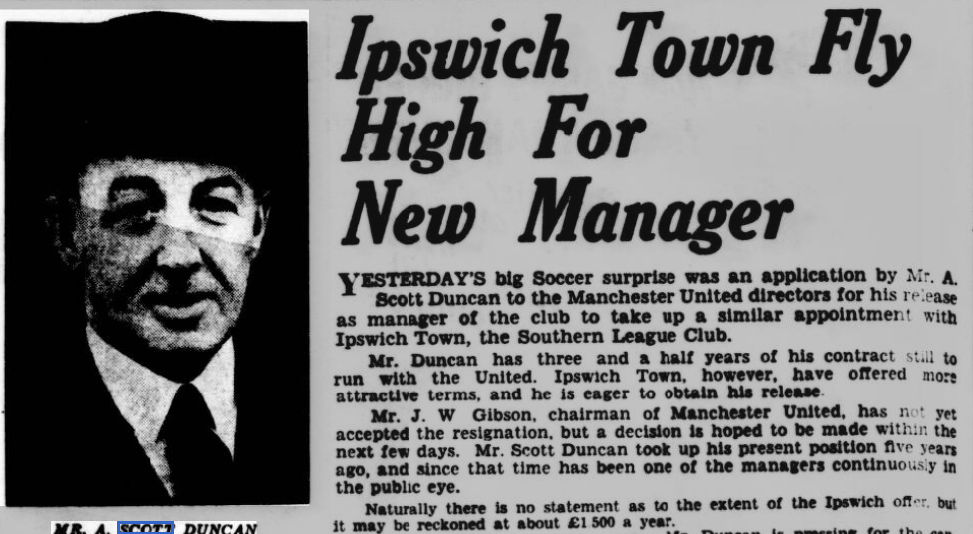
7) When John Wark hooked in that crucial goal in Holland in May 1981 to set the club on their way to UEFA Cup glory, he equaled the all-time record of 14 goals in Europe in one season. The man whose record he matched was Jose Altafini of Milan, who got 14 as they lifted the European Cup in 1963, beating Benfica at Wembley in the final.
Curiously, in the four games Milan played against British clubs on the way to that final, Altafini didn't score a single goal - either against Dundee in the semi-finals, or in the first round - against English champions Ipswich Town.
6) This is from 'Soccer Stars 1976/77'.
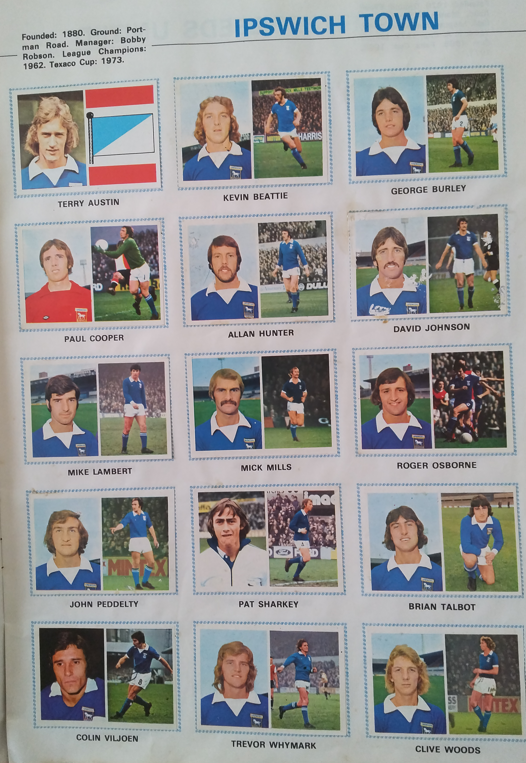
It's a stickers album that reveals a wholly different era in Englsih football. There are over 300 First Division footballers featured, but not a single black player, and not a single foreign player.
The closest to a 'foreigner' in the whole album is there on the Ipswich page. Colin Viljoen was an England international, but he was born in South Africa.
It was a year later, in the run up to the 1978 Cup Final, that Viljoen really felt like an outsider. A week before Wembley, Bobby Robson picked him over Roger Osborne for a League game at Aston Villa. Osborne had been a regular in the Cup run, and the rest of the team were outraged by the decision. They made their feelings clear to Robson by downing tools at Villa Park - resulting in a 6-1 defeat.
Robson got the message, Viljoen was left out at Wembley, and Roger had his moment of glory.
5) Eight months after Scott Duncan moved to Portman Road, the club's day of destiny arrived - the Football League AGM and the big vote. Gillingham and Walsall were the two clubs up for re-election to Division Three South, and before the full League meeting, the clubs in the Southern Section got together to hold their own vote. The result was as follows:
Gillingham 18, Walsall 11, Ipswich Town 11.
Those numbers were conveyed to the Football League, to give 'an indication of the feelings of the lower division'. It didn't look good for Ipswich.
But the clubs in Divisions One and Two paid no heed. When the real vote took place, the results were:
Ipswich 36, Walsall 34, Gillingham 24. Ipswich were in, Gillingham were out.
4) If an Easter double over Norwich City was the key to promotion to Division Two in 1956/57, it was a Christmas double over the Canaries that was the turning point four years later. On Boxing Day, Ipswich won 3-0 at Carrow Road. A day later came a 4-1 victory in the return. Norwich were in the promotion race too that season, and it was that double that gave Ipswich the decisive advantage in the race to be the first East Anglian club in the top flight.
3) Frank's Big Decision
November 27th 1968 - Torquay manager Frank O'Farrell decides not to join Ipswich after all. He'd had lengthy discussions with John Cobbold, giving him the impression that he'd soon be heading to Portman Road. When that didn't happen, Cobbold was furious. 'I'm absolutely shattered. After our talk yesterday I was sure he would take the job'.
Cobbold's feelings can't have been improved a couple of weeks later when O'Farrell decided to quit Torquay after all - to join Leicester. The search for a new man continued - and it was another month before he was unveiled - Mr. Robert William Robson.
2) Bobby Robson's Ipswich - Four Times Champions
That's how it might have been had the club had fewer injuries, a little more luck and a squad with a little more depth.
Let's have a look at the high points in those four seasons - the moments when it looked like the title would be heading back to Portman Road.
a) With eight games to play in 1974/75, this was the table:
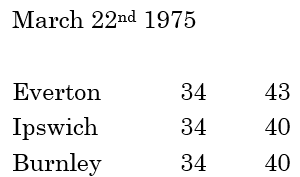
The next game was the big one – Everton v Ipswich at Goodison Park. A win there and it would be neck and neck. And what a start there was to the game. Trevor Whymark put Ipswich ahead after just 66 seconds. Everton were relieved to equalize and come away with their lead at the top still in tact.
Ipswich were still in the race until a 2-1 defeat at Leeds in game number 40. They finished 3rd behind champions Derby, but Robson's team had shown they could be real title contenders.
b) 1976/77
This was the top of Division One with three months of the season to go:
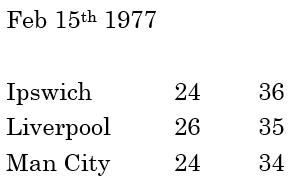
Signing Paul Mariner and switching John Wark to central midfield led to the surge up the table that left Robson's team in a great position. They were still in contention at Easter when Kevin Beattie's famous bonfire incident caused him to miss crucial games, handing the title to Liverpool. Final position: 3rd.
c) 1980/ 81
On March 14th, the table showed that there were just two teams in the title race:
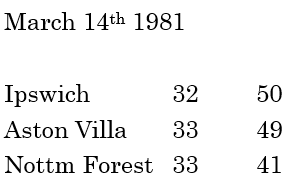
A sequence of away defeats then handed the advantage to Villa, but Town regained the initiative with a 2-1 win at Villa Park in April. The killer blows were the home defeat to Arsenal, and the loss at Middlesbrough on the final day. Final position: 2nd.
d) 1981/82
This is how things stood on January 18th - once again, Town were in total control of their destiny:
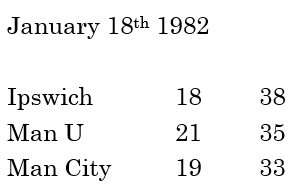
But the key moment was Butcher's injury a week later, and once again it was Liverpool who benefited. Final position: 2nd.
Four times Robson had come close to emulating Alf Ramsey - but then he did follow in Alf's shoes by making the switch from Portman Road to Lancaster Gate.
1) The Miracle
It works both ways. In 1962, Burnley were the ones who looked sure to win the League. On March 3rd, the Clarets beat West Ham 6-0 and were four clear of Ipswich with a game in hand, having scored an amazing 90 goals in 29 games.
But then they fell apart. In the last 13 games they scored just 12 more, winning only twice. Ipswich came past them to land the title - less than six years after sitting one off the bottom of Division Three South.
I wonder what the odds are on Ipswich next season?
[Post edited 12 May 1:28]
|
 | Forum
Thread | Charlie Woods - Ipswich Legend
at 07:52 2 Feb 2024
This is my first post here. I've registered so I can write about Charlie Woods, who I've had the pleasure of talking to this week. Coming soon I'll post an interview with him, but here I want to introduce him by looking at three extraordinary episodes in his career - two from his time as a player, one from his time as a Youth coach.
1) August 29th - September 5th 1960
What a week.
Charlie is 19, and he's still to make his debut in professional football. Brought up in Whitehaven in Cumbria, he's been on Newcastle United's books for a year.
Now suddenly he gets his chance. United have a prestigious friendly at St.James' Park against Barcelona, and he's named on the bench. An early injury gives him his chance, and he'd only been on the field a few minutes when he tried a shot from 25 yards. It flew into the top corner to put United 3-0 up.
This was a legendary Barcelona team - the best team in Spain at the time. Yes, Real Madrid had won the European Cup Final in that famous 7-3 at Hampden, but they weren't La Liga champions. Barca had won the title two years in a row.
Stirred into action by that three goal Newcastle burst, the Catalans roared back and ended up 4-3 winners , with a hat-trick from Sandor Kocsis.
Charlie Woods kept his place in the team for the League game at Fulham two days later - his senior debut. He scored again but United lost 4-3. Then they won 2-0 at Forest before heading for West Brom on the Monday night - a week after the Barcelona game.
Albion had lost all five games that season, but that night it all came right, and they thrashed United 6-0. Their fifth goal came direct from a free-kick, scored by their right half, England international Bobby Robson.
That was the first time the paths of Robson and Woods crossed. Not the last, of course.
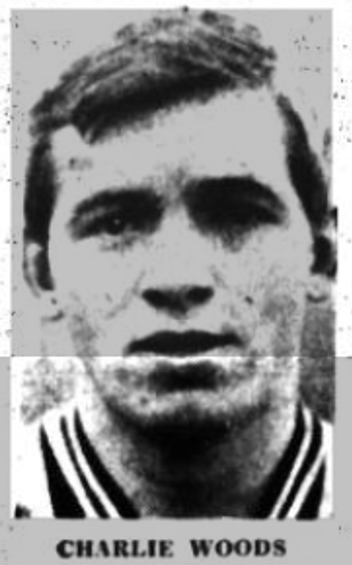
November 17th 1962
After that spectacular start, it didn't really work out for Charlie on Tyneside. Two years later, Third Division Bournemouth signed him. Or at least, they tried to.
On Thursday morning, after Newcastle agreed to sell him, he boarded a train and made the long journey south to London, from where he would head to the south coast.
But then Magpies boss Jim Harvey suddenly realised the club was facing an injury crisis. 'If only I hadn't sold Charlie Woods', he thought. Then he decided to act. Nothing had been signed yet, and he knew what time Charlie's train would be arriving at King's Cross.
This is what happened next, as reported in the Newcastle Evening Chronicle:
A porter at the Great Northern Hotel last night held up the transfer of Charlie Woods to Bournemouth. Manager Jim Harvey, already facing an injury crisis, realised that the referee of Saturday's Southampton v Newcastle game may not allow Alan Suddick to play because of a plaster-cast embracing the broken bones in his right hand.
Harvey rang the porter at the Great Nothern and asked him to stop Woods, who was due at King's Cross. The porter realised the train was already in and he could not get across to the station in time, so he rang the station master, who put out a broadcast on the loud speaker system.
******
The result of this was that Woods headed not to Bournemouth, but to Southampton, where he would join his United teammates.
Two days later, this report appeared in the Saturday morning press:
Charlie Woods will be in League action this afternoon. He will either be understudying Alan Suddick for Newcastle at The Dell, or he will have signed for Bournemouth so he can make his debut at Bristol Rovers. Referee G.W.Pullin will arrive at Southampton this morning, and his first duty will be to check whether Alan Suddick can play with a plaster cast. If he gets the OK, Woods will get in a car and make the dash to Bristol to turn out for the Cherries.
*****
Well, that cast did get the OK, Charlie did make that 100 mile dash to Bristol, he did make his debut, and nine minutes into the game he put Bournemouth ahead, setting them on the way to a 3-0 win.
February 7th 1973
It's fair to say that Charlie never really fulfilled his potential as a player. From Bournemouth he moved on to Crystal Palace, and then Bill McGarry signed him for Ipswich in 1966. He didn't feature much in the promotion season of 67/68, and shortly after that, new boss Bobby Robson sold him to Watford.
When Watford boss Ken Furphy left to take the Blackburn job, he didn't forget Charlie, and soon he appointed him Youth Coach at Ewood Park.
One day in the winter of 1973, Charlie was sitting in a hotel in Blackburn reading the paper when he saw that Ipswich were playing that evening at Bolton in the FA Youth Cup. He decided to head down the A666 and see the game.
In the Main Stand he bumped into Bobby Robson, who told him he was looking for a Youth Coach. 'I've got a job, Bobby', he said. 'At Blackburn'. But Bobby was not deterred. 'Look, the first team are playjng at Stoke on Saturday. Why don't you come and have a chat on Friday. We'll be staying at a hotel just off the M6'.
He went and had that chat. The Stoke game was called off in the end due to the icy weather, but that was of secondary importance. The key business of the weekend had already been concluded. Charlie agreed to move back to Portman Road, and a working relationship that would last on and off for 30 years was about to begin.
Stay tuned. More to come. |
|  | kushiro
|
Site Scores| Forum Votes: | 55 | | Comment Votes: | 0 | | Prediction League: | 0 | | TOTAL: | 55 |
|